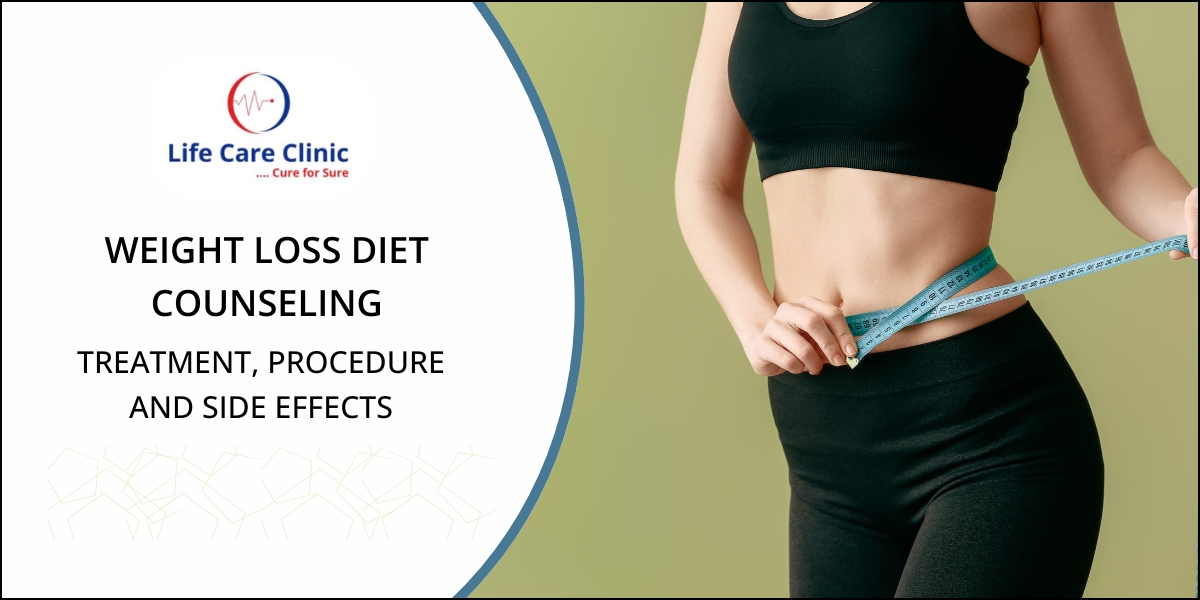Are you tired of trying every new diet trend without lasting results? You’re not alone. Sustainable weight loss is less about drastic, short-term fixes and more about building healthy, lifelong habits.
What is Weight Loss Diet Counseling?
Weight Loss Diet Counseling is a personalized, science-backed approach to managing your weight. It’s not a one-size-fits-all diet plan but a collaborative process between you and a healthcare professional, like a General Physician or dietitian. The goal is to understand your unique body, lifestyle, and challenges to create a sustainable and effective weight management strategy.
The Treatment: More Than Just a Diet Plan
The core of the treatment lies in education and behavioral modification. Instead of simply handing you a restrictive menu, a good counselor will:
-
Conduct a Comprehensive Assessment: This includes reviewing your medical history, current eating patterns, activity levels, and even sleep and stress.
-
Set Realistic Goals: Together, you’ll set achievable, short-term and long-term goals, moving away from the scale’s tyranny and focusing on non-scale victories like increased energy and better health markers.
-
Provide Nutritional Education: You’ll learn about portion control, macronutrients, reading food labels, and making smarter food choices without feeling deprived.
-
Develop a Personalized Plan: Your plan will fit your cultural preferences, budget, and daily routine, making it easier to stick with.
The Procedure: What to Expect
-
Initial Consultation: Your first visit is the most detailed. The doctor will discuss your weight loss goals, medical background, and lifestyle. This is your opportunity to ask questions and voice your concerns.
-
Diagnostic Tests (if needed): Sometimes, underlying issues like thyroid disorders or vitamin deficiencies can hinder weight loss. Your doctor may recommend simple blood tests to rule these out.
-
Plan Creation & Follow-ups: Based on the assessment, a customized diet and lifestyle plan is created. Regular follow-up sessions are crucial for monitoring progress, troubleshooting challenges, and making necessary adjustments to keep you on track.
Potential Side Effects and Considerations
The primary “side effect” of proper diet counseling is positive: improved health! However, transitioning to a new eating pattern can sometimes cause:
-
Temporary Hunger or Cravings: As your body adjusts to healthier foods and portions, you might experience initial hunger pangs.
-
Mood Fluctuations: Reducing sugar and processed foods can lead to temporary mood swings.
-
Nutritional Gaps: If not done correctly, a poorly planned diet can lack essential nutrients.
Ready to begin your sustainable weight loss journey? Consult with Dr. Meghana Pande, an experienced General Physician in Hadapsar, Pune, for personalized Weight Loss Diet Counseling and take the first step towards a healthier, more confident you.
Frequently Asked Questions (FAQs)
1. What is the best diet for weight loss?
There is no single “best” diet. The most effective diet is a balanced, calorie-controlled plan tailored to your individual needs, preferences, and medical conditions, which a diet counselor can help you create.
2. How much does weight loss counseling cost?
The cost varies based on the provider’s expertise, location, and program duration. It’s best to contact the clinic directly for specific pricing.
3. Can I lose weight without exercise?
Yes, weight loss is primarily driven by a calorie deficit achieved through diet. However, combining a good diet with exercise accelerates results, improves metabolism, and offers numerous health benefits.
4. How fast can I lose weight safely?
A safe and sustainable rate of weight loss is 0.5 to 1 kilogram (1-2 pounds) per week. Rapid weight loss can lead to muscle loss and nutritional deficiencies.
5. What is the role of a diet counselor?
A diet counselor provides expert guidance, personalized meal planning, accountability, and continuous support to help you develop healthy eating habits for long-term weight management.




